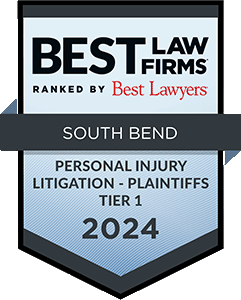Massive class action suits, plaintiffs with debilitating injuries, and defense attorneys finding the smoking gun are a few images that the average person brings to mind when thinking about personal injury law. In truth, most personal injury lawsuits are settled out of court, and while lawsuits are common, many victims never see the inside of a courtroom.
Personal injury lawsuits are based on the injury that the plaintiff has suffered, and the incident that caused it. The injury itself can take on several forms, but the incident is limited to negligence, intentional act, or recklessness. Let’s take a look at the types of injuries that could lead to a personal injury lawsuit.
If you are considering filing a lawsuit, contact our South Bend personal injury attorneys for a free legal consultation.
Physical
The majority of personal injury lawsuits involve physical injury claims. They are caused by a number of incidents, such as auto accidents in South Bend, work hazards, drug defects, and medical malpractice. Aside from the cause of the injury, the extent of the physical damage suffered can determine whether or not you have a case to pursue. The goal of the court is to make the victim (in legal terms, the plaintiff) whole.
To do so, the plaintiff’s attorney must prove that the injuries caused by the defendant’s act had a physical impact. The attorney will order medical examinations in order to determine if the injury is a major or minor one, and the length of time that it will impact the plaintiff and his or her life. Major and permanent injuries receive the highest consideration, as well as disfigurement, because implies a lifelong reminder of the injury. These types of injuries are generally compensated highly in lawsuits and settlements.
However, some short-term and seemingly minor injuries may also be cause for action. Injuries that prevent that cause the plaintiff to miss a considerable amount of work while healing is an example of a short-term injury that could be cause for a lawsuit. A minor injury that accompanies an emotional or mental injury may also make a valid case. The best thing to do when deciding if your injury is too minor or short-term for a lawsuit is to consult an attorney.
What you see as too small for a case may be the perfect grounds for a damages lawsuit to obtain compensation.
Mental
You may have a case for damages without having been physically injured. In these cases, the injuries are mental, in the form of mental defect caused by the incident, or emotional injuries caused by the trauma impacted by the incident.
- Mental defects are injuries that result in coma, mental retardation, or memory loss, for example. These are often permanent injuries that have a great impact on the plaintiff’s quality of life after the incident.
- Trauma-related mental injuries aren’t always permanent. However, like mental defect injuries, trauma-related injuries greatly impact the victim. Conditions like post-traumatic stress syndrome, depression, and phobias are a few examples.
- Emotional distress is another cause of action that isn’t often a lawsuit on its own. The claim often accompanies other physical or mental injuries. Witnesses to an incident that caused someone else physical injury may have a claim for emotional distress. Fear that affects the lives of the people involved or emotional reactions that prohibit the victim from proceeding with his or her life as usual may have a claim for emotional distress.
The bottom line is that if you or someone you know has been seriously affected in one of these ways, consult a personal injury attorney in Indiana to see if you have a case. Each state limits damages for certain injury claims, and only a personal injury attorney can determine if the case is worth pursuing or not.
Don’t rule out suing for damages without first having a free consultation with a personal injury attorney.











